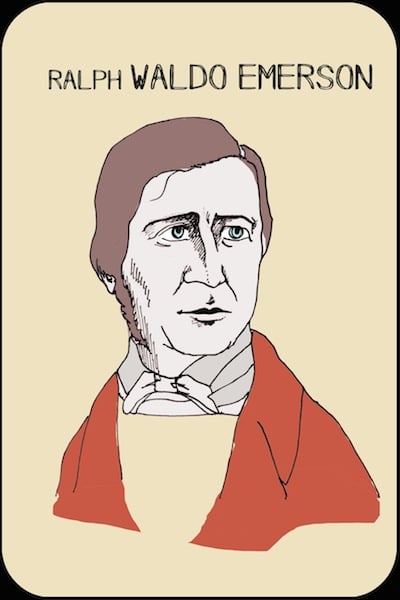Ralph Waldo Emerson
By:
May 25, 2014

Mention RALPH WALDO EMERSON (1803–82) and you’re likely to be returned some line about individualism or transparent eyeballs, his early figure for the delights of thinking. But far from the I-built-it valence of our present world’s idea of individualism, Emerson was after an understanding of person as a kind of illuminated steering instrument built and charactered (a favorite verb) by the circulations of nature’s power and intelligence: something of deeply common property. Taking the “irresistible dictations” of individual fate takes one far from the Ayn Rand side of the willpower spectrum. His work made incursions into the skeletal structure of philosophers who followed, like Friedrich Nietzsche and William James, whose works embed recapitulations and recastings of Emerson’s sentences. But beyond his place in the history of philosophy, Emerson remains meaningful for his charge to love and stay attracted to the world by committing to its relentless unsettling, its ownwardness. Read the literature on Emerson and you will find many variations. Stanley Cavell initiated a renewed appraisal of the philosopher Emerson with his ear for the under- and overtones of Emerson’s onward chord, for the way all growth, all success, is ringed with loss. I read Emerson because he reminds me that privacy is a path toward the common, and that the places where a culture fixes value can become, instead of openings, places of obstruction. It was the idea that life is a “circular power always returning to itself” that meant the most to Nietzsche, and the indictment of social conformity’s littleness as a block on this power’s circulation. I love, too, his deep-time cautions against self-evaluations of progress, certainty, or success. “Life is a series of surprises,” he writes, “and would not be worth taking or keeping, if it were not.”
***
On his or her birthday, HiLobrow irregularly pays tribute to one of our high-, low-, no-, or hilobrow heroes. Also born this date: Miles Davis, Tom T. Hall, Rosario Castellanos, Luc Sante.
READ MORE about members of the Monomaniac Generation (1795–1804).
